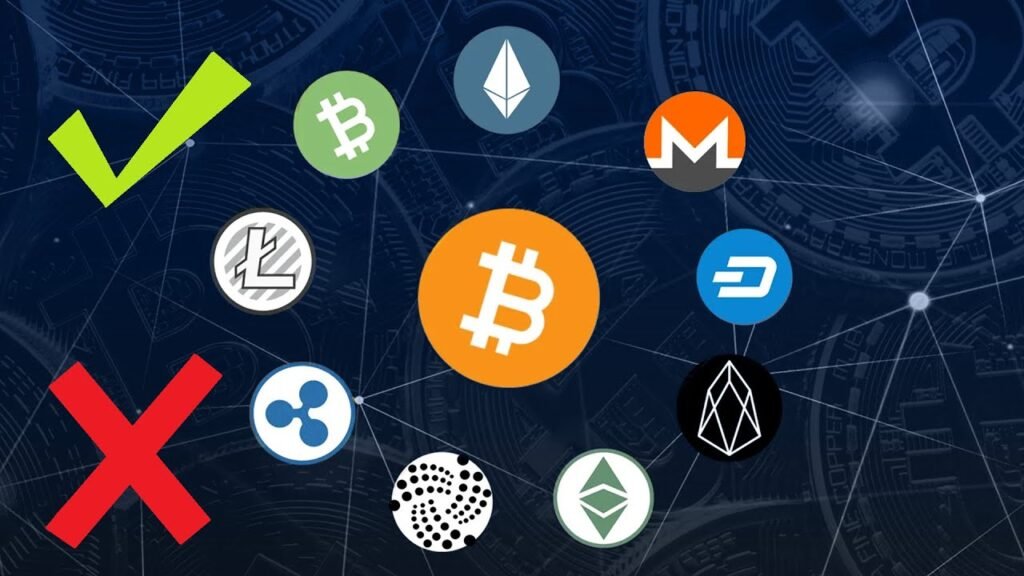Altcoins The Evolution and Impact Beyond Bitcoin

Introduction to Cryptocurrencies, Altcoins push the boundaries of blockchain technology, offering specialized solutions and use cases that go Bitcoin’s foundational framework. Most people associate cryptocurrency with Bitcoin. In the introduction to cryptocurrency, Bitcoin was the first and most famous digital asset and led the cryptocurrency market.
There is an entire ecosystem of altcoins outside Bitcoin. Altcoins The Evolution, short for “alternative coins,” are the several digital currencies created since Bitcoin’s 2009 launch. These coins now improve blockchain scalability, enable decentralized finance, and promote gaming and privacy innovation. This article will explain altcoins, how they differ from Bitcoin, their sorts, and their significance in the cryptocurrency ecosystem.
The Rise of Altcoins
Bitcoin was created as a decentralized, peer-to-peer digital currency by an anonymous individual (or group of individuals) known as Satoshi Nakamoto. As a result of Bitcoin’s success, blockchain technology gained popularity, and developers and businesspeople started producing other cryptocurrencies that would overcome some of its drawbacks.
Regarding market valuation and recognition, Bitcoin is still the most popular cryptocurrency, but its underlying technology has drawbacks. Some of these are scalability problems (the system’s capacity to manage a huge volume of transactions), restricted scripting capabilities, and a comparatively high environmental impact due to energy-intensive mining techniques. Many altcoins were, therefore, developed to enhance or provide capabilities that Bitcoin could not provide.
Types of Altcoins
Altcoins The Evolution can be roughly divided into a number of categories, each having unique features and objectives. The most popular types of altcoins are as follows:

Forks of Bitcoin
Altcoins alter Bitcoin’s code Bitcoin splits. New coins form when blockchains fork. Bitcoin forks seek speed, governance, and scalability. Notable Bitcoin forks. Bitcoin Cash was launched in 2017 to scale Bitcoin. Larger blocks allow more transactions per second. SV: “Bitcoin Satoshi Vision,” another Bitcoin fork, prioritises a bigger block size and Bitcoin’s original vision. Bitcoin SV prioritises enterprise adoption and scaling. Forks of Bitcoin share a codebase but have distinct aims, transaction times, and block sizes.
Ethereum
Ethereum, the first and most popular smart contract platform, lets programmers create decentralised financial (DeFi) protocols and dApps. Other notable platforms include Cardano. However, which prioritises sustainability and scalability, Binance Smart Chain (BSC) offers low transaction fees and fast speeds, and Solana (SOL) has low costs and high throughput. These platforms advance blockchain technology, enabling more effective and diverse use cases than transactions.
Stablecoins
Stablecoins are connected to a reserve asset to maintain value—gold or US dollar fiat money. This steadiness can avoid Bitcoin’s dramatic price swings. Popular stablecoins include Tether, USDC, and Dai. They provide stability and liquidity in the bitcoin ecosystem and are widely used as safe havens for trading, remittances, and DeFi platforms.
Privacy Coins
Users get privacy and anonymity with “privacy coins” cryptocurrencies. Contrary to Bitcoin’s anonymity, privacy coins hide sender, receiver, and amount information, making transactions harder to track. Popular privacy currencies include Zcash (ZEC) and Monero (XMR), which use stealth addresses and ring signatures. However, these currencies are valued for their secure transactions, which appeals to financial privacy-conscious individuals.
Meme Coins
Rather than having solid technological underpinnings, meme coins and niche cryptocurrencies frequently become well-known through online communities, humour, or viral trends. Shiba Inu and Dogecoin are two examples that take advantage of the momentum generated by social media. Compared to more well-known cryptocurrencies like Bitcoin and Ethereum, meme coins and niche cryptocurrencies are riskier investments due to their highly speculative value, even though they can provide sizable short-term gains.
Altcoins in the Cryptocurrency Ecosystem
Because they provide answers to issues like scalability, privacy, and smart contract functionality that Bitcoin was not intended to address, altcoins are essential to the cryptocurrency ecosystem. Their inventions have made decentralized banking, blockchain interoperability, and new types of digital assets possible, many of which go with Bitcoin’s original goals.
Altcoins The Evolution continues to challenge Bitcoin’s dominance by providing distinctive features and functionalities. Even though Bitcoin is still the most popular cryptocurrency by market capitalization, because of its diversity, the cryptocurrency industry has grown, and new use cases that were previously unthinkable in the early days of blockchain technology have been explored.
Also Read: Tom Lee Predicts Bitcoin Surge to $145K by 2024
In summary
The vast array of cryptocurrencies that exist outside of Bitcoin is represented by altcoins. Each of which has unique features, applications, and technological developments. However, Altcoins have broadened the cryptocurrency industry and produced an ecosystem of digital inventions, decentralized services, and financial applications, ranging from Bitcoin forks like Bitcoin Cash to smart contract platforms like Ethereum and privacy coins like Monero.
However, In Introduction to Cryptocurrencies, Altcoins The Evolution will continue to be essential in propelling blockchain innovation and acceptance as the cryptocurrency environment changes, providing solutions that meet the demands of diverse consumers and sectors. Anyone wishing to learn more about cryptocurrencies and blockchain technology must have a solid understanding of altcoins.
[sp_easyaccordion id=”5181″]
